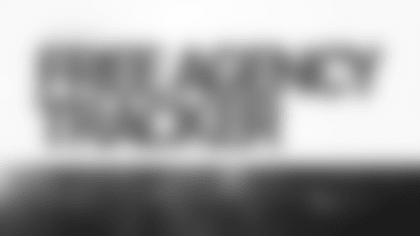The week was different from 17-odd years ago, something Mark Lamping didn't mind a bit.
Lamping early this week attended his first NFL Owners Meetings as the Jaguars' president, and as he did, he said he recalled a similar experience that in one sense wasn't similar at all.
This was mid-September, 1994. Major League Baseball players were on strike, Lamping was two weeks into his job as St. Louis Cardinals President and league owners were meeting to decide the fate of the World Series.
Lamping's boss, Anheuser-Busch President August Busch III, sent Lamping to the meetings as the Cardinals' lone representative with orders to speak forcefully regarding ownership sticking together – even at the cost of canceling the rest of the season and World Series.
"I show up, 36 years old, two weeks after I've been on the job, and when (Major League Baseball Commissioner) Bud Selig asked did anyone have any comments before they voted, I raised my hand and gave some very strong comments at the direction of my boss," Lamping said Friday morning with a laugh.
Seated in his office at EverBank Field Friday, Lamping smiled at the memory, and added of this week, "Obviously I did not say anything at my first NFL Owners Meetings."
What Lamping said he did was listen. And learn. While he spent the last four years working with the New York Jets and Giants as CEO of the New Meadowlands Stadium Company, he said the four days this week at The Breakers in Palm Beach, Fla., was his first opportunity to see the inner workings of the league.
On Friday, Lamping sat down with jaguars.com to share his thoughts not only on that experience, but on a few of his views a month into his tenure as Jaguars president:
*Question: First off, what were your thoughts on the meetings this week? *
Answer: I was very impressed by the professionalism, presentations and the quality of the NFL staff, and how well-organized everything was. Obviously I was observing. I may have gone to an owners meeting a long time ago when I was with Anheuser-Busch in a sports marketing capacity, but I wasn't in the meetings. I've been around them the last few years when they had owners meetings in conjunction with the Super Bowl, but I had never been inside an NFL owners meeting.
Q: What was your objective there?
A: Really, a couple of things. One was to do a lot of listening and absorb as much as I could within the meetings themselves, and also begin to establish as necessary relationships with counterparts on other teams. I've known a lot of the NFL owners over the years and gotten to know them better over the last four years. I just wanted to re-establish and establish some of those connections.
Q: You obviously have been in the president's role for a long time with the Cardinals, so you're not a novice in this. Do you seek counsel from other NFL owners on the differences between the leagues?
A: The one thing I have found more so in football than I observed in baseball is there really is a tremendous amount of information-sharing. There is a lot of work in terms of best practices. It's a very open and sharing environment. I saw that literally in my first five minutes in a meeting this week. Your seats are assigned and (Jaguars Owner) Shad (Khan) and I were sitting across from Bob Kraft and Jonathan Kraft (of the New England Patriots). I had met Jonathan before and I had been introduced to Bob Kraft, but literally within the first five minutes they were offering to do anything they possibly can to help us. They encouraged us to come visit them and let them take us through everything that they do with the idea we might be able to learn something from them that could benefit us in Jacksonville.
Q: For decades now that has been the mark of the NFL, that the league comes first.
A: I don't think there's any question about that and it's reflected in the very high percentage of the revenue that is equally shared amongst the teams – and the real commitment that there is parity. All leagues are interested in that, but my observation was there is more information-sharing between the teams and willingness to really jump in and help teams get better in the NFL. The NFL believes that as the league goes so go all the teams.
Q: When you first took the position as Jaguars president, a big topic obviously was the regional growth of the Jaguars. Is that something you discussed with people at the owners' meetings?
A: Not so much. We're a little unique in that regard. I have a pretty good base of what's important from my baseball days. The question as it relates to us is making sure we get the right components in place and we do it right. It begins with a very, very strong plan and a plan that we can sustain over a number of years.
Q: While you're on the topic, a month in do you have a firmer grasp of what that will take in Jacksonville and in this area?
A: First and foremost, we're going to make sure we have a very clear identity of what we're all about – what we stand for, what our vision is and to ensure it is a positioning of the Jaguars brand that not only is compelling and relevant in Jacksonville, but also something that works equally well when you get out of our core market. We're working on that now. We're not there yet. We've been working with the NFL in terms of doing some of that brand analysis and positioning work. We're making progress. We're on a parallel path in terms of working with Team Teal to launch a caravan and doing it the right way. We're trying to make sure we're successful and that we're not trying to do too much too fast.
Q: And during your first month has that been a focus?
A: First, it's just getting to know the people, and trying to understand why we're organized the way we are. It's no secret that we're probably going to move some job responsibilities around. Now that I'm here I bring certain resources and certain expertise. We'll be reorganizing things a little bit – nothing drastic. We want to make sure we're structured in a way that on a very collaborative basis we'll be able to attack our problems. While we have collaboration and try to involve more people in the major decisions, we want to do it in a way that we still have a level of accountability. Having people work on projects is a great thing, but you always want to make sure you have somebody who's responsible for making sure the project stays on track. We always need to be collaborative for a lot of different reasons. No. 1, you have a lot of people who are really smart and have a good idea what's going on. And while you do that you cannot lose sight that someone needs to be responsible for making sure the job gets done. That's probably something you're going to see sooner as opposed to later. You have to have something that has the ability to not only work well but that also has the ability to sustain itself. You don't want to be changing something every six months.
Q: There were some key messages in the league meetings. Discuss those, if you will.
A: One is that this is not the time to sit back and relax as a league. We have a very good relationship with the players and we have a very strong relationship with our broadcast and media partners, but that just creates a platform for us to grow. (NFL Commissioner) Roger (Goodell) was very clear that player health and safety was a continued focus moving forward, and we're very focused on protecting the shield, as he described it. One of the interesting aspects he talked about relates to our social responsibility platform and our goals to cultivate and grow the next generation of NFL fans – there's quite a bit of discussion about our investment back into the community. The NFL is focused on several key initiatives – having kids be active, the Play 60 initiative; breast-cancer awareness; and, saluting the military and supporting the military. As an organization, we do a lot in the community through direct team activities and the foundation. We can have an even greater focus on those things that are important, high-profile initiatives for the NFL and that translate to the field. All three of those I mentioned you end up with logos on the field and in some cases have special uniforms. All of the things we're doing support a consistent message and to the degree we can do that, our resources can be stretched a lot further.
Q: Ticket sales obviously remain a key issue . . .
A: Things are progressing well. We have a long way to go. I get a ticket sales report every morning. The first thing I look at every day is how we did the day before. It's clear throughout our ticket sales department that I'm watching ticket sales every day. That's the lifeblood. We all want to have as many fans in the stands as possible. It does a lot of things, not the least of which is to support our primary goal, which is to support (General Manager) Gene (Smith) and (Head) Coach (Mike) Mularkey and our players to give them every possible opportunity to be successful and eliminate any potential barriers.
Q: As we close, any overall thoughts? What have you seen in the first month?
A: I'm even more excited about the possibilities. I'm blown away by the community. We've been here a little over a month and we've probably met more people than we met in four years in New York. It feels much more like home, and that's not a surprise. I was born and raised and grew up in the Midwest. It's also been really interesting to find out how high quality the people are that work here.














